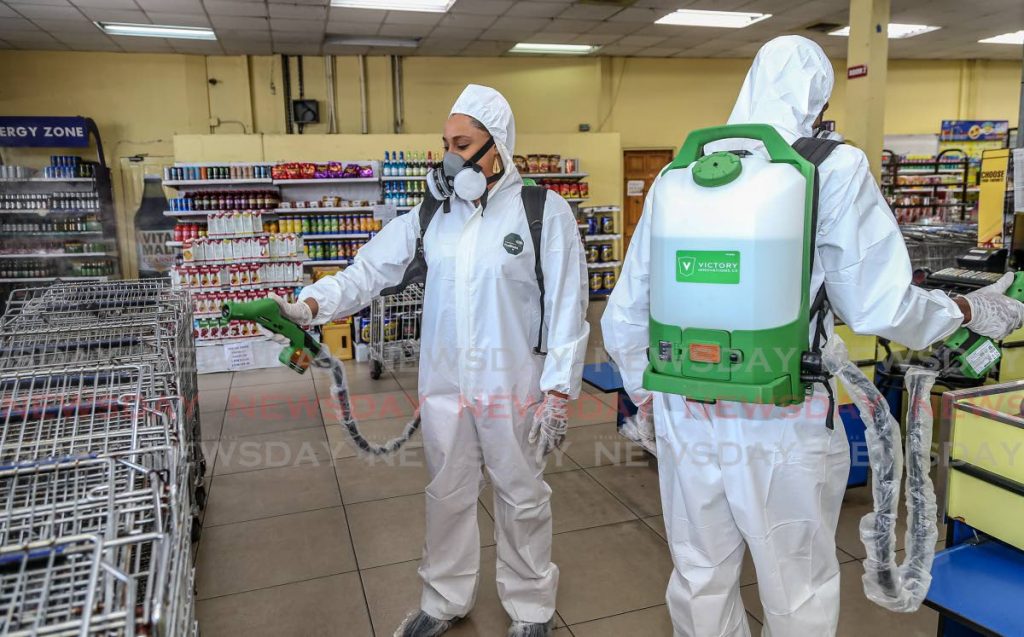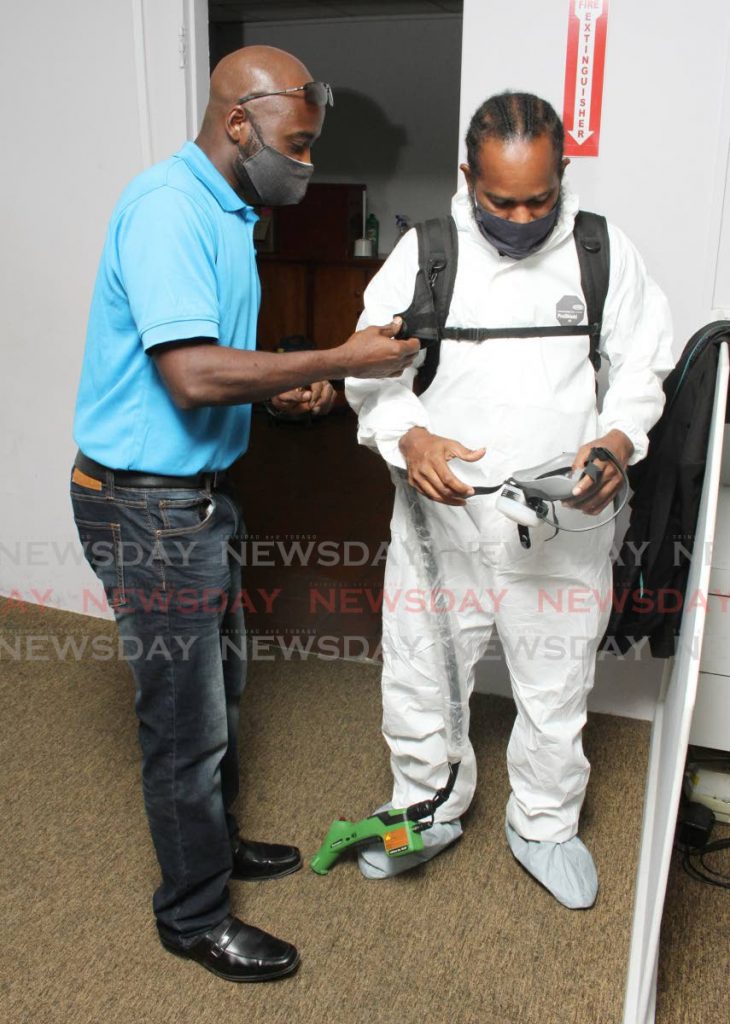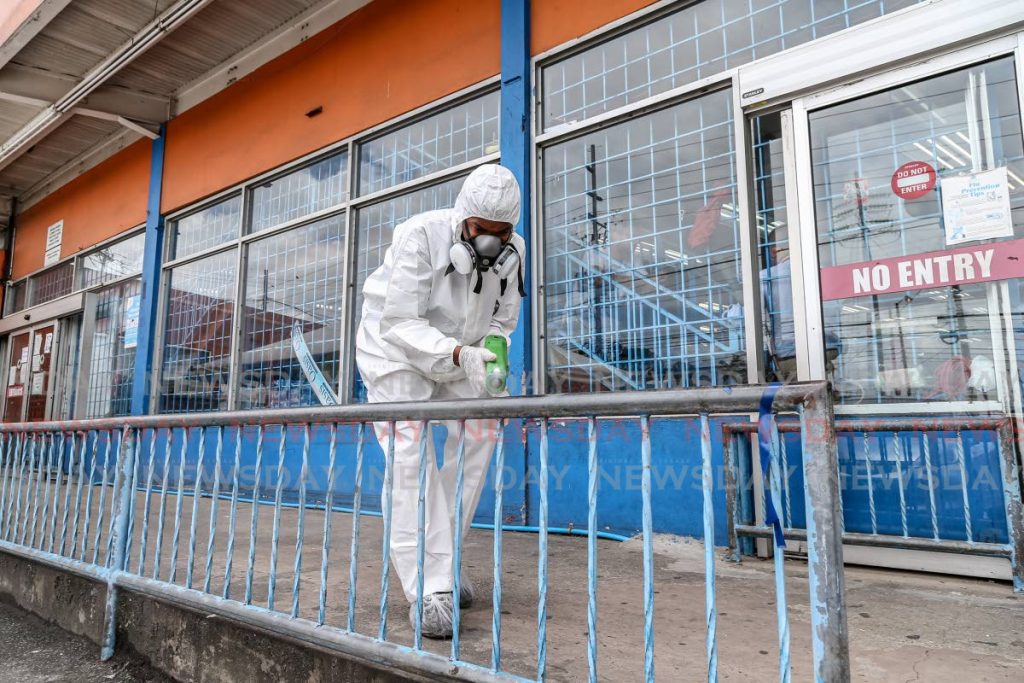Isanitizeworld takes sanitising to the next level

WITH the onset of the covid19 pandemic and a spike in cases in TT, the issue of cleaning and sanitisation of people and places remains on the front burner. And one local service, isanitizeworld, wants to take that process to the next level and help get everyone back to work.
"We need to change our entire way of thinking and cleaning. We are not just cleaning, we have to sanitise," said Ricardo Gill, director of operations at Trinidad Innovation.
Trinidad Innovation, an engineering company, was formed about 20 years ago and is owned and operated by Gill's business partner and company CEO Nigel Nanan. Gill explained it is primarily an engineering company focusing on merging different forms of technology. Nanan currently operates a hot and cold engineering service in Tobago and operates in hotels and restaurants. Gill's company is Kokino, which renovates stores and converts shipping containers into buildings.

He and Nanan were high school friends and when Gill returned to Trinidad after 25 years in Canada, working as a Royal Canadian Mounted Police officer, the two decided to go into business. When covid19 hit Trinidad, they decided to go into sanitising services and Gill wanted to bring the best technology to TT. In his research, he found that electrostatic sanitising was being used in about 30 countries.
"As a leader in the Caribbean we need to be at the forefront of technology (in sanitisation). We need to do better than bleach."
The sanitisation arm of Trinidad Innovation, isanitizeworld, began in February. It provides electrostatic sanitisation and Gill explained the process is essentially a spray ramishot at a 40 micron size (a micron is one millionth of a metre). It is administered by their sanitisation technicians who receive training from their supplier as well as in-house training on the chemicals, machines, personal protective equipment (PPE) and the virus. Inside the spray is the chemical VitalOxide, which Gill pointed out is US Environmental Protection Agency approved, skin safe and food safe.
"So it is not going to cause any allergic reactions or anything like that. So (the technician) really doesn't need the full (PPE) suit but it's a good practice to employ because when you are going into an area that may have been exposed (covid19) could still be in the environment. You want to make sure you minimise any contact. It is an extra layer of protection."
He said at the end of the service, the technician's suit is taken off and disposed of, and the mask and the equipment is sanitised in a decontamination protocol.

And what about good old bleach and a cloth? Gill stressed people wiping a surface with bleach was better than nothing, but anywhere that is wiped that is not wet with chemical would spread the virus around and make the situation worse.
He explained with fogging, the process is meant to dissipate into the air but the virus is only airborne between people's mouths and up to about 16 feet (4.8 metres) on a light droplet.
"The fogging is not going to get anything that falls on a surface. Fog is not going to get into your soft surfaces like a couch. It just gets into the air and might kill a couple of mosquitoes. But fogging is not the ideal scenario (for covid19)."
And finally with regular spraying Gill said it is designed to spray out and falls down. He explained if the right chemical is used this will kill what is on the surface but you will not get behind the surface.
"What electrostatic does compared to the other two is that it adds a positive electrical charge to whatever liquid you have in the reservoir. This positive electrical charge causes it to be attracted to anything with a neutral or negative charge, which is anything that is grounded – our bodies, the table, anything."
Gill said it binds at 75 times the force of gravity and clings to everything around.
"So if I spray a door handle with electrostatic it's going to surround and envelop the door handle."
He also said electrostatic spraying will go into the pores of porous fabrics. The chemical dries within three minutes and there is no residue which makes it safe for papers and glass. It lasts for two to three days and will continue to kill anything that comes on top of it and would only be rendered non-effective if it is wiped out, Gill explained.
He said the process is 99.99 per cent effective in killing the virus but stressed no system is the "end all, be all" but was just a component in the preventative process. He added that while soap (which should involve "scrubbing" of hands and forearms rather than just washing) and bleach work, the issue was getting to the virus where it is.
Isanitizeworld services schools, hospitals, gyms, hotels, airports, retail stores, malls, corporate offices, churches, government offices, concerts and special events. On the pricing, Gill said it could be from 50 cents to $3 a square foot, but the company cannot give a price without seeing the site. He explained the level of work for an empty warehouse would be different from the Naparima Bowl where every seat has to be sanitised.
And how has business been? Gill said it has been "okay" as the company has the dual issues of misinformation about fogging and regular spraying and the need to educate people about the system.

PHOTO BY JEFF MAYERS -
"Trinidadians are not typically early adopters."
The company also plans to introduce cellphone sanitisers and "sani-arch sanitising gateways" (personnel arches). These no-touch arches will sanitise people as they walk through, includes facial recognition that will check if the person is wearing a mask, and temperature scanning. If the person is not wearing a mask, or their temperature is too high an alarm will go off.
Gill said the arches, which can be purchased or rented, are great for schools, government offices, parties or anywhere with a lot of traffic. There is an outdoor, portable version of the arches which he said could be used for a Carnival fete.
Gill reported the company has already sold several arches to Jamaica and the first step in their general expansion plan was to move up the Caribbean, cleaning as they go.


Comments
"Isanitizeworld takes sanitising to the next level"